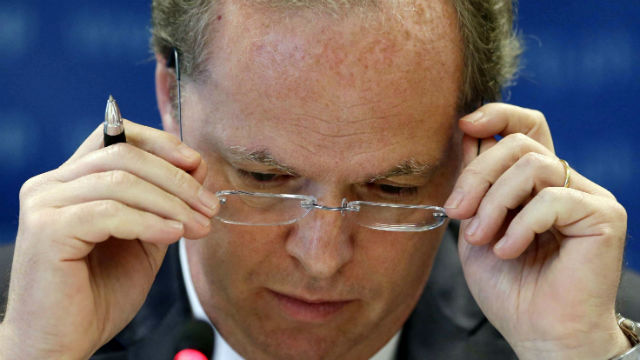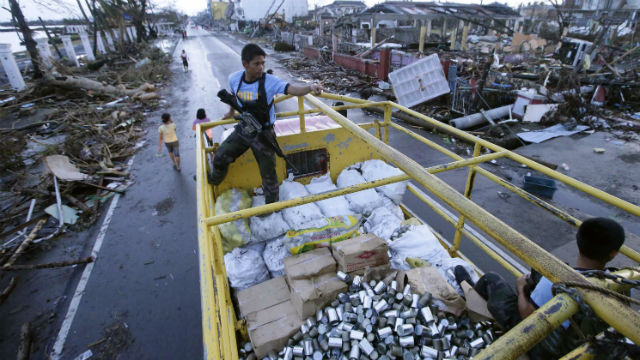SUMMARY
This is AI generated summarization, which may have errors. For context, always refer to the full article.

MANILA, Philippines – The Philippine government’s timely implementation of its recovery and reconstruction programs for the areas affected by Typhoon Yolanda (Haiyan) will help reduce the super typhoon’s economic and social impact, says a ranking World Bank (WB) official. It will also help the country maintain a high growth rate that would benefit the poor.
World Bank Vice President for East Asia and Pacific Axel van Trotsenburg made the observation after visiting Tacloban City a month after the super typhoon slammed the Philippines. Van Trotsenburg met with residents, as well as local and national government officials on December 5-6.
“In my short visit to Tacloban, I was able to get a sense of the devastation caused by Typhoon Yolanda and have been impressed by how people are coping and working extremely hard to clean up, rebuild and start the long road towards normalization,” van Trotsenburg said.
He added that WB will support the survivors of Yolanda in their reconstruction efforts “over the months and years ahead” while being guided by the “human face of (the) tragedy.”
“This obliges us to act quickly and work with all involved parties toward a quick implementation of the recovery and reconstruction measures…,” van Trotsenburg said.
WB country director in the Philippines Motoo Konishi also said that “timely implementation will enable the typhoon-affected communities to rebuild their homes, their livelihoods and infrastructure faster and better, thereby mitigating the disaster’s social impact while maintaining the country’s growth momentum.”
Monetary assistance
On Friday, December 6, the WB board of executive directors approved a US$500 million quick disbursing budget support for the Philippine government to use in short-term recovery and reconstruction efforts. (Read: P38.8B: Govt’s 5 immediate priorities post-Yolanda)
The fund is a Development Policy Loan (DPL), which is designed to provide quick-disbursing assistance to countries undertaking reforms. DPLs support “policy and institutional changes needed to create an environment conducive to sustained and equitable growth.” The loan has a final maturity rate of 25 years and a grace period of 10 years.
WB said the government already started formulating recovery and reconstruction plans a week after the typhoon’s landfall. WB disaster risk management specialists assisted the government in assessing damages and in identifying priority areas for immediate rehabilitation support.

Affected GDP
Prior to the super typhoon, the Philippines’ gross domestic product (GDP), according to WB, was at 7.0% in 2013, 6.7% in 2014 and 6.8% in 2015. (Read: PH growth slows to 7% in Q3)
WB Philippines lead economist Rogier van den Brink said that if the government will implement a rapid and effective recovery and reconstruction program after Yolanda, it is “likely” that the country’s GDW growth rate will be 6.9% in 2013, 6.5% in 2014 and 7.1% in 2015.
“The costs of Yolanda’s reconstruction program include the substantial mark-up for both the private and the public sector to rebuild at the higher standards needed to deal with the more extreme weather events caused by climate change,” van den Brink said. (Read: How Yolanda cancelled progress on poverty reduction)
According to WB, recovery and reconstruction cover “humanitarian relief, reconstruction and rehabilitation of public infrastructure, social safety net programs, livelihood activities, and public grants for targeted interventions to replace some of the private assets or properties of the poor and most vulnerable, including their homes.”
Long road ahead
Konishi said that post-Yolanda reconstruction efforts will take a long time and everyone involved “will need perseverance and persistence.”
He assured the public, “We (World Bank) are steadfast in our commitment to help the country recover from this tragedy and will continue to support the Filipino people’s efforts to build a more resilient and prosperous Philippines.”
Meanwhile, van den Brink said finding a “fiscally sustainable solution” that deals with the frequent disasters while maintaining the “current excellent economic performance” are key to the country’s growth. – Rappler.com
Add a comment
How does this make you feel?
There are no comments yet. Add your comment to start the conversation.